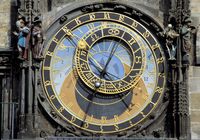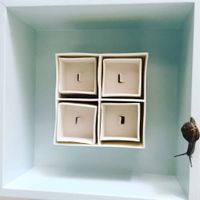"Speed is the form of ecstasy the technological revolution has imposed on man."
In a novella that spans the entirety of a single night, wrapping a short span of human existence in the dose of a few hours, Czech novelist Milan Kundera (April 1, 1929 - July 11, 2023) (I should mention he considered himself a French novelist) delivers an examination of slowness, the passage of time, and our passion for life.
"Speed is the form of ecstasy..." Kundera tells us in Slowness using his characteristic mental fragments that add up to a narrative. Like most complex things, slowness is perhaps best examined by reviewing its opposite: speed.
Speed is the form of ecstasy the technical revolution has bestowed on man. As opposed to a motorcyclist, the runner is always present in his body, forever required to think about his blisters, and his exhaustion; when he runs he feels his weight, his age, more conscious than ever of himself and of his time of life. This all changes when man delegates the faculty of speed to a machine: from then on, his own body is outside the process, and he gives over to a speed that is noncorporeal, nonmaterial, pure speed, speed itself, ecstasy speed.
We chase efficiency, saving up moments for later. What if we lived in stillness and saved up moments of speed? "I'll run when I'm dead," said no one. When did time become our dominant regulator, the driver of our existence? Is it post-industrial or post-modern technology? Or has it always been thus?
I harken back to Jun'ichiro Tanizaki's one-hundred-year-old refreshing essay on the pleasure of sitting outside at night (in the toilet, as it were) under the wind's softness.
The parlor may have its charms, but the Japanese toilet truly is a place of spiritual repose. It always stands apart from the main building, at the end of a corridor, in a grove fragrant with leaves and moss. No words can describe that sensation as one sits in the dim light, basking in the faint glow reflected from the shoji. Lost in meditation or gazing out at the garden.From Jun'ichiro Tanizaki's In Praise of Shadows
 The horologe, clock of the Old Town Hall in Prague, Czech Republic. Its first version dates back to 1410, and this visible version dates from the 1560s. Learn more. When did clocks become central urban regulators?
The horologe, clock of the Old Town Hall in Prague, Czech Republic. Its first version dates back to 1410, and this visible version dates from the 1560s. Learn more. When did clocks become central urban regulators?Kundera's main character, unnamed, finds himself and his wife at a rather Bacchanalian chateau soiree, an audience of characters who drift in and out of the scenes as if driven by a force greater than the author's pen. The character muses on the nostalgic past while watching the other guests. It is Midsummer evening, a day that seems to have no beginning, no end. Yet marks a turning point of celestial consequence: "Why has the pleasure of slowness disappeared?" our hero wonders, as casually as one choosing socks or lipstick.
Why has the pleasure of slowness disappeared? Ah, where have they gone, the amblers of yesteryear? Where have they gone, those loafing heroes of folk song, those vagabonds who roam from one mill to another and bed down under the stars? Have they vanished along with footpaths, with grasslands and clearings, with nature? There is a Czech proverb that describes their easy indolence by a metaphor: "They are gazing at God's windows." A person gazing at God's windows is not bored; he is happy. In our world, indolence has turned into having nothing to do, which is a completely different thing: a person with nothing to do is frustrated, bored, is constantly searching for the activity he lacks.
Kundera calls slowness a pleasure. Is it? Poetry inculcates slowness, multiple reads, and pondering, "You can never read a poem too slowly," advised Stephen Fry in his guide to poetry writing. Mary Oliver once asked how to spend this "one, wild-life" and answered it should be spent listening to the mystical harmony emanating from rivers and reeds. What would you do in slowness? Appreciate the antiquity of things, suggests Tanizaki, echoed by his countryman Okakura Kakuzo in his monograph on the Japanese tea ceremony.
Is it pleasure, or is it perhaps memory? The body has memory; if we moved in speed once, we expect to move in speed again. Age denies us this freedom, and yet our mind remembers. I know something about speed; being a manic-depressive. Mania is essentially the speed of the emotions, of the person herself. It is heightened intake and heightened processing. My physical non-mind self struggles to keep pace with the nervous system. The metaphors of the illness (notwithstanding Susan Sontag's unequivocal reasoning on the metaphor's misleading nature) are accurate: racing thoughts, the mind running wild, and feelings of a crash and burn. If I could wish one thing for myself, it would be patience. My earliest article on The Examined Life was a piece on snails and slowness, an attempt to begin how I meant to go on.
 "Miniature Spaces" by Irish ceramist Isobel Egan. I once spent an afternoon with a garden snail and some of my favorite ceramic artworks.
"Miniature Spaces" by Irish ceramist Isobel Egan. I once spent an afternoon with a garden snail and some of my favorite ceramic artworks.Kundera connects speed to technology, even before the age of the internet. Technology has always been about movement and efficiency. In Slowness, Kundera positions two characters against each other: one wistfully slow and the other a full arm-sweep of speed such that the entire night courses and crests - catastrophically - under his velocity.
Speed is forgetting. Forgetting the past and erasing our anxiety as a memory of the future. Seneca reasoned as much more than two millennia ago: "Nothing, to my way of thinking, is better proof of a well-ordered mind than a man's ability to stop just where he is and pass some time in his own company." But why are we so loathe to sit still? What comes to us when we slow, pause, or exist silently, unmoved, unhurried?
Kundera surmises, again through one of his characters:
His step firm, he hastens toward his motorcycle; he desires his motorcycle, he is swept with love for his motorcycle, for his motorcycle on which he will forget everything, on which he will forget himself
If we run fast enough, we outrun memory and thus outrun our future as predicted by memory. That pain will revisit us more than once, in whatever form it takes.
 The slowness of trees bows me. "One of the majestic Beech pollards at Vinney Ridge, Hampshire. Probably about 350-400 years old, according to Ade Parker, a tree verifier for the Woodland Trust. Learn more.
The slowness of trees bows me. "One of the majestic Beech pollards at Vinney Ridge, Hampshire. Probably about 350-400 years old, according to Ade Parker, a tree verifier for the Woodland Trust. Learn more.Slowness is Kundera's first novel written in French, a second language in a second country he made his home after being stripped of citizenship from his birth country, Czechoslovakia. Kundera was repatriated in 2019. Did he carry a mental memory of running from home his entire life? Can one who is banished ever rest?
The body has a memory of movement of speed; do we remember slowness similarly? Likely not; we are not slow in our formative years. I have two young children, and just the other day, my husband likened them to puppies; he meant they have constant movement. Perhaps it is not technology that nudges our feet forward swiftly but our speed impulse that nudges technology.
Fast or slow, we cannot change the nature of time. Kundera arrived at his ninety-fourth year in 2023. Is he reminiscing on the velocity of his life like Oliver Sacks did at the same age? Sacks was wildly extroverted and wrapped everyone into his fascinating quest to see science and humanity simultaneously. Kundera is quieter; his novels sit affixed separately from dogma or political convictions. And yet Kundera seems to say: unless we run right through to death, everything will catch up to us.
Companion Kundera's rich thoughts on our modern affliction with Thich Nhat Hanh's anthem of Buddhist stillness, Rebecca Solnit's meditation on being lost with nowhere to go and Alan Lightman's praise of wasting time, and my meandering study of breaks and play: a concept of releasing our minds into idleness, a movement towards unintended - or insignificant - purpose.


